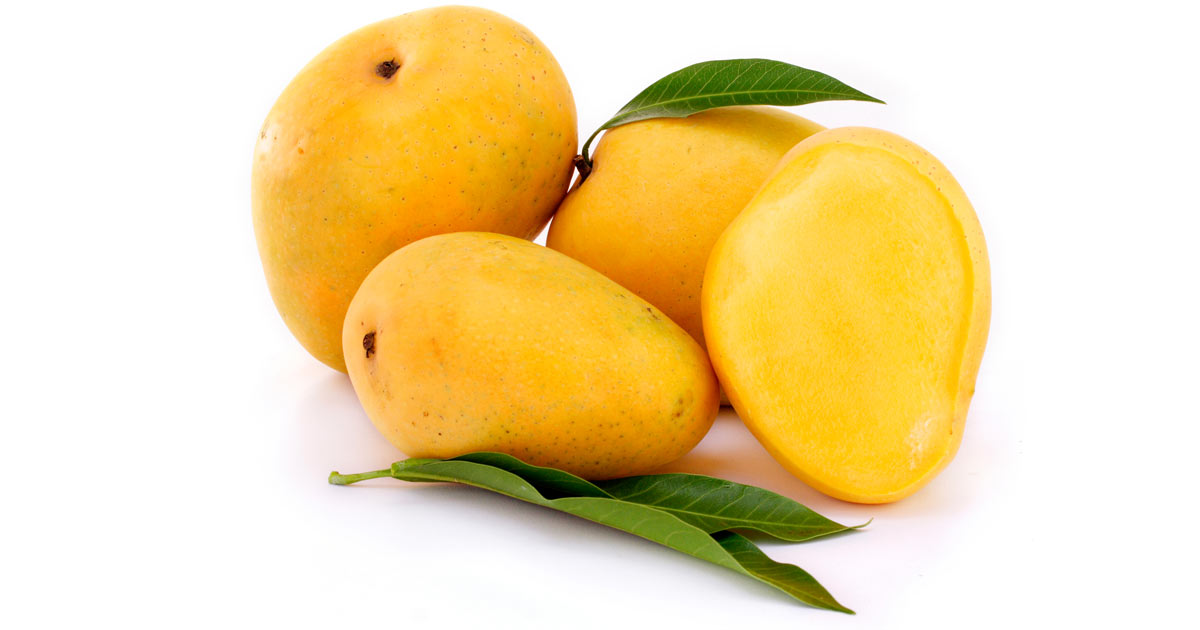Mango: Tropical fruit for lowering blood sugar, boosting brain health
 |
The mango is a delicious tropical fruit that is native to South Asia and enjoyed for its sweet flavor and extensive nutrient profile.
Mango Nutrition Facts
Belonging to the flowering plant family Anacardiaceae and going by the scientific name Mangifera indica L., mangos are filled with vitamins, minerals, fiber and antioxidants. Each serving is also relatively low in mango calories, making it an incredibly healthy and nutrient-dense food. So which nutrients are present in mango?
One cup of raw mango fruit contains approximately:
107 calories
28 grams carbohydrates
1 gram protein
0.4 gram fat
3 grams dietary fiber
45.7 milligrams vitamin C (76 percent DV)
1,262 international units vitamin A (25 percent DV)
0.2 milligram vitamin B6 (11 percent DV)
1.8 milligram vitamin E (9 percent DV)
6.9 micrograms vitamin K (9 percent DV)
0.2 milligram copper (9 percent DV)
257 milligrams potassium (7 percent DV)
23.1 micrograms folate (6 percent DV)
0.1 milligram riboflavin (6 percent DV)
0.1 milligram thiamine (6 percent DV)
In addition to the nutrients listed above, the mango nutrition profile also contains a small amount of niacin, magnesium and pantothenic acid — as well as powerful antioxidants like zeaxanthin, quercetin, astragalin and beta-carotene.
 |
Mango Ice Cream.
Top 11 Mango Benefits
1. Lowers Blood Sugar Levels
Rich in fiber plus an array of power-packed antioxidants, adding mango to your diet can have a big impact on blood sugar levels. For example, one study out of Oklahoma actually found that supplementing with mango for 12 weeks significantly reduced blood sugar levels in obese adults.
The fiber in mangos may also help promote normal blood sugar levels. Fiber passes through the gastrointestinal tract undigested, slowing the absorption of sugar in the process. With three grams, or up to 12 percent of your daily fiber needs ,in a single serving, enjoying mangos as part of a well-rounded healthy diet can support overall glycemic control.
2. Regulates Blood Pressure
Sometimes called “the silent killer,” high blood pressure affects an estimated 70 million American adults, and about one in five is completely unaware that he or she has it. High blood pressure places extra strain on the heart, forcing it to work harder to pump blood throughout the body so it can continue to work efficiently.
Mangos are rich in magnesium and potassium, which are two essential nutrients that are absolutely vital when it comes to regulating blood pressure. Plus, they’re also naturally low in sodium, a micronutrient that should be limited in those with high blood pressure.
3. Boosts Brain Health
Considered one of the best brain foods, mango nutrition is packed with vitamin B6, which is essential for maintaining brain function. In fact, some research suggests that a deficiency in this key vitamin could contribute to impaired cognitive function and neurological decline. Vitamin B6 and other B vitamins are also crucial for maintaining the function of brain neurotransmitters and aid in supporting a healthy mood as well as regular sleep patterns.
 |
Green Mango with Dipping Sauce.
4. May Protect Against Macular Degeneration
Age-related macular degeneration is a common condition that causes destruction of the macula, the part of the eye that provides sharp, central vision. It can lead to night blindness, blurry, distorted vision and even blindness.
In addition to the wealth of vitamins and minerals supplied by the mango nutrition profile, this powerful fruit also contains the antioxidant zeaxanthin. Zeaxanthin works to filter out harmful blue light rays, thereby playing a protective role in eye health as well as possibly preventing macular degeneration symptoms. Studies show that increasing your intake of key antioxidants like zeaxanthin can help increase macular pigment density to preserve vision and prevent macular degeneration.
5. Supports Strong Bones
Mangos are an excellent source of bone-building vitamin K, cramming in up to 9 percent of your daily needs in just one cup. This important nutrient is involved in bone metabolism and helps maintain adequate amounts of calcium in the bone tissue. Interestingly enough, a study published in the American Journal of Clinical Nutrition actually found that a vitamin K deficiency may be associated with lower bone density and an increased risk of fractures.
6. Optimizes Heart Health
Heart disease is a major problem in the United States and around the world, accounting for an estimated 31.5 percent of global deaths in 2013. Fortunately, switching up your diet and adding more nutrient-rich foods like mango to your menu may help optimize heart health to protect against heart disease.
Mangos contain high amounts of pectin, a type of soluble fiber that can help naturally lower cholesterol levels in the blood. Combined with the low sodium levels as well as high amounts of potassium and B vitamins, mango nutrition may help keep your heart healthy and reduce the risk of heart disease.
7. Combats Cancer Cell Growth
As previously mentioned, mangos are high in pectin. Pectin not only helps lower cholesterol levels in the blood, but may also guard against prostate cancer, according to some in vitro studies. A compound within pectin combines with galectin-3, a protein that plays a role in inflammation and cancer progression. Additionally, high dietary intakes of vitamin C and beta-carotene, an antioxidant found within the mango, have also been linked to increased survival rates in men with prostate cancer.
Plus, one in vitro study conducted by the University of Queensland even found that extracts of mango flesh and peels were effective at blocking the growth of breast cancer cells as well. Although research is still in the early stages, this suggests that mangos may be a helpful part of natural cancer treatment protocol.
 |
Mango Salad.
8. Slows Signs of Aging
Mangos are jam-packed with several anti-aging nutrients that can help slow the signs of aging to keep you looking youthful for as long as possible.
In particular, mangos are rich in vitamin A, a micronutrient that helps promote tissue repair and is often used topically to fight wrinkles and skin aging. They’re also loaded with vitamin C, an antioxidant that protects against oxidative damage and boosts the production of collagen. Collagen is a type of protein that can slow signs of aging by reducing joint pain and preserving skin elasticity.
9. Increases Immune Function
Your immune system is your body’s first line of defense against unwanted invaders and has everything to do with keeping you healthy and feeling your best. Squeezing in about 76 percent of the vitamin C you need for an entire day, mangos can help support a healthy immune system to ward off illness and infection.
A study in the Annals of Nutrition & Metabolism actually found that getting enough vitamin C in your diet could help reduce the duration and severity of respiratory infections like the common cold, plus decrease the incidence of other conditions, such as malaria, pneumonia and diarrhea infections.
10. Improves Digestive Health
With three grams of fiber in a single cup of fresh mango nutrition, adding this nutritious fruit to your daily diet can do wonders when it comes to the health of your digestive tract. Fiber can help add bulk to the stool to increase stool frequency in people with constipation. High-fiber foods like the mango may also help protect against other gastrointestinal conditions, including hemorrhoids, GERD, intestinal ulcers and perticulitis.
11. May Protect Against Asthma
As you may recall from the mango nutrition lineup, mangos are chock-full of beta-carotene and vitamin A. Due to this, it could potentially act as an asthma natural remedy. Asthma occurs as a result of inflammation in air passages, resulting in temporary narrowing of airways transporting air from the nose and mouth to the lungs. This leads to difficulty breathing, wheezing, coughing, chest tightness or even death.
Studies show that levels of vitamin A and beta-carotene may be lower in children with asthma. Although it’s unclear exactly what role these essential nutrients may play, these findings indicate that they may have some impact on allergic diseases, such as asthma.
Precautions
Although there are plenty of benefits of mango, there are some downsides that need to be considered as well.
Since mangos are of the same family as pistachios or cashews, if you have an allergy to these nuts, then you should probably avoid mangos. Additionally, mangos are also very distant relatives of poison ivy, so some people may be sensitive to them. Some people with latex allergies have also had a cross-reaction to mangos, so use caution and be sure to address any concerns with your doctor.
Many people also wonder: Can you eat mango skin? Mangos and their peels contain tiny amounts of urushinol, which can trigger dermatitis in those sensitive to it and may also cause food allergy symptoms like itching, burning and swelling of the skin, so it’s best to avoid the skin whenever possible.
Finally, keep in mind that there are a relatively high amount of calories in mango compared to other fruits, so don’t gorge on more than one at a time. Instead, have a great dessert finish to a healthy meal, or mix with some protein (like goat milk or coconut milk) for breakfast or enjoy alongside some whey protein for a snack./.
( By Rachael Link, MS, RD )
Recommended
 Handbook
Handbook
Vietnam Moves Up 8 Places In World Happiness Index
 Handbook
Handbook
Travelling Vietnam Through French Artist's Children Book
 Multimedia
Multimedia
Vietnamese Turmeric Fish among Best Asian Dishes: TasteAtlas
 Handbook
Handbook
From Lost to Found: German Tourist Thanks Vietnamese Police for Returning His Bag
 Handbook
Handbook
Prediction and Resolution for the Disasters of Humanity
 Handbook
Handbook
16 French Films To Be Shown For Free During Tet Holiday In Vietnam
 Handbook
Handbook
Unique Cultural and Religious Activities to Welcome Year of the Snake
 Handbook
Handbook
